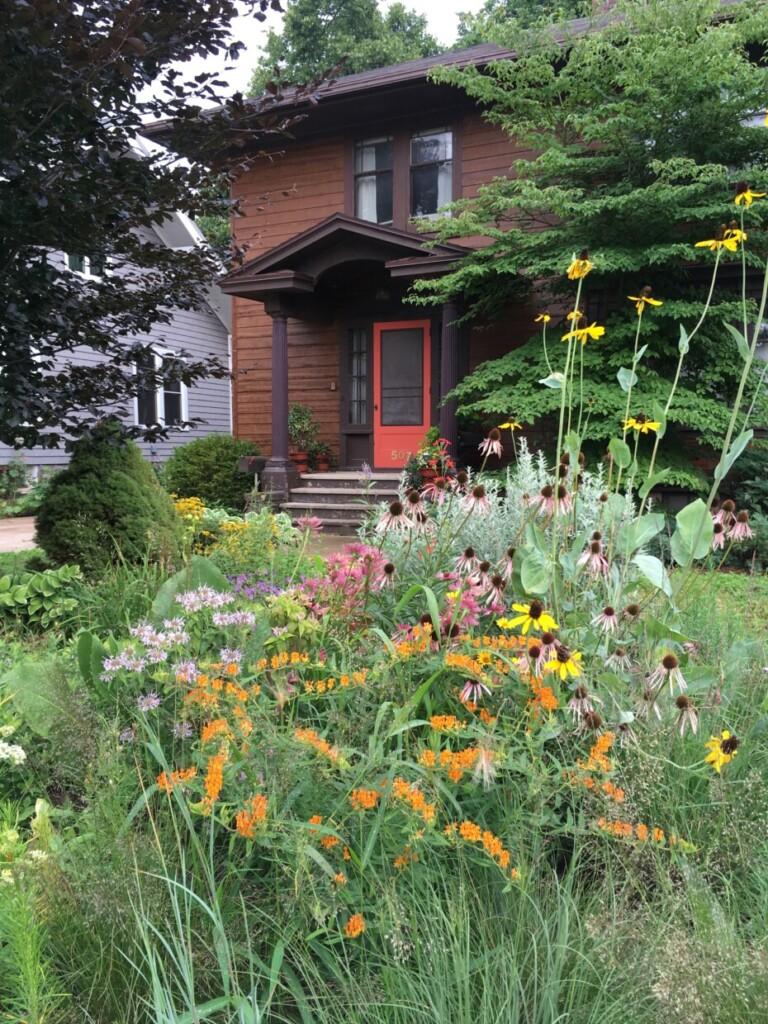During the pandemic, gardening has become a popular hobby for those who are looking to grow their own food, relieve stress or even just spend more time outside creating something beautiful.
“I find [gardening] to be great stress relief. Just digging around in the dirt is a good relief from daily life,” Mary Kelly, a freshman double majoring in environmental science and French and one of three recently elected co-leaders of Hoop House for next semester, said.
This gardening trend has many positive effects for both the individual and the wider community, but gardens can become even more beneficial for the environment when native plants are consciously incorporated into the design. Wild Ones: Native Plants, Natural Landscapes is a nonprofit organization that aims to do just that.
According to their website, Wild Ones’ mission is to “promote environmentally sound landscaping practices to preserve biodiversity through the preservation, restoration and establishment of native plant communities.”
They do this by providing information about native landscaping and designs that are created by professionals but are meant to be understood by first-time gardeners. The native garden designs are specifically designed for different ecoregions within the U.S. and take into account variables such as light, soil and moisture conditions.
According to Laurie Johnson, president of the local Central Upper Peninsula Chapter of Wild Ones, the Minneapolis and Milwaukee native garden plans include plants best suited for the U.P. region. All of the designs are free and downloadable, as well as the lists of native plants in each design and planting information.
When living in dorms or apartments, not everyone has the opportunity to start a native garden in their own backyard. However, community gardens are great places to begin your gardening journey and are also great resources for beginning gardeners.
“Reach out to community resources because there are a lot of community gardens in cities that are places where you can start to learn about growing vegetables or help out with other people growing vegetables,” Lovisa Kunkle, a senior majoring in biology and one of three recently elected co-leaders of the Hoop House for next semester, said. “You can even start super small like growing a pot of flowers in your house or something and see how you like it without actually investing too much money into it.”
Starting out small with a native garden is not only easier for care and maintenance, but Wild Ones makes native garden plans that are designed for gradual implementation.
“The gardens are designed to be built incrementally, so you can add new areas and new plants as your space, time and funds permit,” according to the Wild Ones Central U.P. chapter press release. “The gardens also favor species with long and staggered bloom times, to not only enhance the beauty of the garden but provide pollen and nectar through the growing season.”
The pollen and nectar of these native plants benefit not only the native wildlife in the U.P. but can also assist in helping migratory insects like the monarch butterfly.
“Our area, and the tip of the Stonington Peninsula specifically, is a significant gathering area for thousands of monarchs as they gather to begin their 2,000 mile journey to Mexico each fall … Wildflowers such as ironweed, goldenrod, aster, blazing star, sunflowers and Joe Pye Weed are some of the best native fall nectar flowers for Monarchs,” according to the Wild Ones Central U.P. chapter press release.
By planting native flowers that are beneficial to wildlife like the monarch butterfly, gardens not only become more beautiful but now play a larger role in the community.
According to Doug Tallamy, author of “Nature’s Best Hope” and an honorary director for Wild Ones, one of the biggest mistakes in our approach to conservation is the idea that “nature” is something set aside in preserves and parks. He believes that conversation is everyone’s responsibility and native gardens are one of the best solutions for sustainability.
“Plants do a great job of capturing carbon from the atmosphere, which is a big part of this whole environmental movement. With the native plants, I feel like they are a great way to attract pollinators, and again capturing carbon from the atmosphere and helping with climate change,” Kelly said.
Plants also are known to increase the amount of water held by the soil and lessen the amount of soil erosion in certain areas. Not only is increasing the density of plants on earth important for all life, but specifically increasing the number of native plants in a community is specifically beneficial for a number of reasons, including increased habit and food sources for native wildlife, decreased pesticide usage and healthier ecosystems.
“Another great thing about native plants is that they don’t require pesticides and herbicides to survive. That’s something that is often applied to grass lawns so that they can appear as uniform as possible since grass is the only plant being managed. Pesticides and herbicides like this can harm the native insects and animals, and these high maintenance lawns require huge amounts of water and care,” Kunkle said. “Sometimes native plants might look like weeds, but it’s really just about changing the idealistic view of what an American yard should look like.”
To learn more about starting a native garden or to get a free copy of the “Native Garden Design Guide” available in both print and digital format, contact Laurie Johnson at [email protected] or 906-428-4358.
























